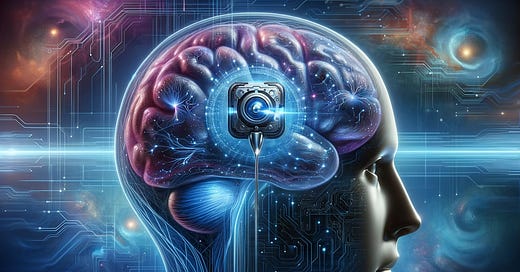In a futuristic vision where technology transcends the boundaries of the human mind, imagine a revolutionary advancement in the realm of memory and interaction: neurological transmitters. These aren't figments of science fiction but a speculative glimpse into a potential new era. Picture a tiny, sophisticated device, embedded within the brain, acting as a meticulous archivist of our every memory, where forgetting becomes a matter of choice, not an inevitability of human nature.
Envision a world where a simple question like, "How did we meet?" doesn't rely on the fallible and often fragmented human memory. Instead, you and your friend are instantly transported back to that very moment, experiencing it from both perspectives, as vivid and tangible as the day it happened. This technology doesn't just enable us to remember; it allows us to re-live, offering an intimate, front-row view of life's most cherished moments.
Consider the transformative impact on shared experiences. Couples could revisit their first date, reliving the butterflies and excitement. Friends could laugh together at jokes and moments long forgotten. It's akin to a mental time machine, but with this incredible potential comes significant ethical considerations.
A paramount concern is privacy. With access to another's memories, the line between personal and shared experiences becomes blurred. Imagine an argument where one could simply dive into the other's memories for evidence. This raises critical ethical dilemmas and privacy concerns, questioning the sanctity and ownership of personal experiences.
The educational sector could witness a paradigm shift, with students experiencing historical events or scientific phenomena through their educator's memories, enhancing understanding and engagement. The therapeutic potential is significant, particularly for those suffering from memory loss, offering a chance to reclaim forgotten parts of themselves. On a personal level, the ability to share memories could lead to deeper empathy and understanding among people, strengthening interpersonal relationships.
However, the cons are equally significant. The foremost concern is the invasion of privacy. The ability to access others' memories could lead to unprecedented levels of personal intrusion. There's also the risk of memory manipulation - the altering or fabricating of memories could lead to false accusations or a distorted perception of reality. Additionally, an over-dependence on this technology might atrophy our natural memory skills, making us reliant on artificial means to recall our past.
As we stand on the brink of this technological marvel, we must consider its broader societal implications. How will it change our social dynamics, culture, or even our legal systems? This innovation represents more than just a leap in technology, it's a fundamental shift in the way we perceive and interact with our memories. The advent of neurological transmitters is not just a step forward in technology; it's a redefinition of the human experience. In navigating this new landscape, we must balance the allure of eternal remembrance with the sanctity of individual thought and experience. The future of memory is upon us, inviting us to contemplate its profound implications and our role in shaping them.




